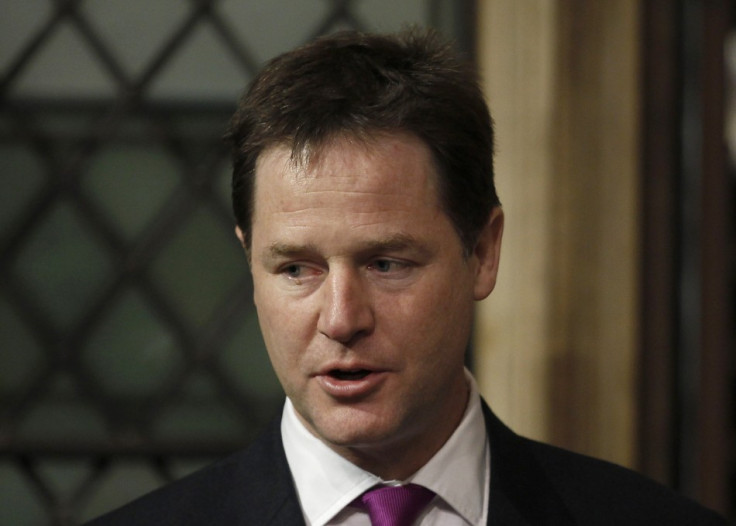Leveson Inquiry: Phone Hacking at News International an Illegal Activity on Industrial Scale, Says Nick Clegg
Deputy prime minister continues to distance himself from Rupert Murdoch over serious failure of corporate governance

Deputy prime minister Nick Clegg claimed that the News of the World phone hacking scandal displayed a lack of corporate governance at News International and accused the company of engaging in illegal activity on an "almost industrial scale".
At the Leveson Inquiry into press ethics, Clegg continued to distance himself from media mogul Rupert Murdoch, whose proximity to the cabinet has been put under scrutiny.
"It beggars belief that illegal activity was taking place on an almost industrial scale," he said. "That's a failure of corporate governance on a serious scale."
His comments come on a day when he risks driving a rift through the coalition by ordering Liberal Democrat MPs to abstain in a vote of support for David Cameron's backing of culture secretary Jeremy Hunt. Cameron refused to refer Hunt to the parliamentary standards watchdog over his close involvement with the Murdoch empire, which had been revealed at an earlier Leveson hearing.
Labour will table a motion in the House of Commons to see Hunt referred to ministerial code advisers over concerns that he breached his duty of impartiality as an overseer of Murdoch's News Corporation bid to take over BSkyB.
Clegg's action shows a clear aim to keep the Lib Dems clear of the dirt being flung by the inquiry, as Cameron's cabinet comes under fire for its close relationship with the tabloid press.
Clegg's rhetoric appears to mirror that of the culture, media and sport sub-committee, which laid the blame for the scandal at Murdoch's door, declaring him "not a fit person" to run a major international company.
Cleggs' evidence follows revelations made by former prime minister John Major that Murdoch asked him to alter his policy on Europe in 1997 in return for News International support, drawing further criticism of the scale of influence wielded by the media group.
Rather than being treated as a media darling, Clegg highlighted the poor treatment of the Lib Dems in the lead-up to the 2010 general election, which he described as "indifference at best, or derision at worst".
Counsel for the inquiry, Robert Jay QC, asked Clegg his thoughts on the negative coverage he received from the tabloids when his popularity spiked following the televised leaders' debates.
Clegg said that the spike irritated news organisations that typically backed Labour or the Conservatives.
"That's the nature of politics," he said. "If you back the red or blue team and suddenty there is a yellow team, you want to get them off the field of play. You do that not by going after the ideals, but by going after the man. That's as old as the hills."
Taking the opportunity to praise the press for its "campaigning zeal", Clegg said there was much to celebrate with the freedom and political voice of the press.
He stressed the importance of "getting the balance right" when it comes to inevitable contact between politicians and the media.
Arguing that it was right and proper for politicians and press to seek each other out, he added: "This relationship should be laced with a heavy degree of scepticism and a certain degree of distance.
"This [distance] should exist between the political class and and any vested interest group in the country, such as the trade unions or any other."
It was unrealistic, he said, to imagine the press and politicians operating at a distance in "hermetically sealed silos" but that the style of that relationship should be better maintained.
He admitted that pure self-regulation had not worked for the press, claiming the Press Complaints Commission was relatively toothless, but argued that statutory controls would have a negative effect on press freedom and content.
He argued that journalists should show more respect for the editors' code of conduct, claiming that it would be a "cul-de-sac" to attempt to use statutory controls to unravel fact, comment and opinion.
In his witness statement he condemned the "sense of impunity" felt by some members of the press.
"This was left unchecked because of weak and ineffective corporate governance and politcians were nervous of the implications of taking action," he added.
"It is reasonable to ask whether the unhealthy relationship between politicians and the media contributed to a culture of impunity."
Labour leader Ed Miliband told the inquiry that Murdoch should be forced to sell off one of his newspapers in the name of plurality.
© Copyright IBTimes 2025. All rights reserved.





















